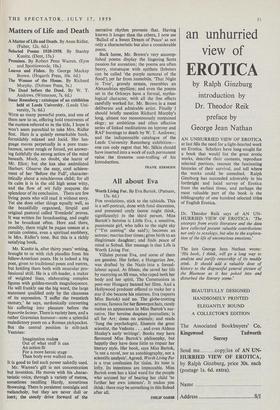All about Eva
FOR revelations, stick to the tabloids. This is a self-portrait, done with fond discretion, and presented coyly (some might think, significantly) in the third person. Miss Bartok's heroine is Little Eva, a sensitive, passionate girl, who talks to the night sky (' "I'm coming" she said'); becomes an actress; marries four times; gives birth to an illegitimate daughter; and finds peace of mind in Subud. Her message is that Life is Worth Living For.
Villains pursue Eva, and some of them are genuine. Her father, a Hungarian Jew, was drafted by the Nazis into a forced- labour squad. At fifteen, she saved her life by marrying an SS man, who raped both her body and her spirit. The Communists in post-war Hungary banned her films. And a Hollywood producer offered to make her a star if she became his mistress. Eva (reports Miss Bartok) said no. The globe-trotting actress, famous for her flowerpot hats, rarely makes an appearance in Miss Bartok's nar- rative. Her heroine despises journalists; is all for Art; dotes on animals; and reads 'Jung the psychologist, Einstein the great scientist, the Vedanta . . . and even Aldous Huxley's early writings'. Books may have flavoured Miss Bartok's philosophy, but happily they have done little to impair her literary style. Her book, says Miss Bartok, 'is not a novel, nor an autobiography, nor a scientific analysis'. Agreed. Worth Living For is a true confession for tinies. Its tone is lofty. Its intentions are impeccable. Miss Bartok even has a kind word for the people who accused her of bearing her child `to further her own interests'. It makes you think: there may be something in this Subud after all.
PHILIP OAKES






































 Previous page
Previous page